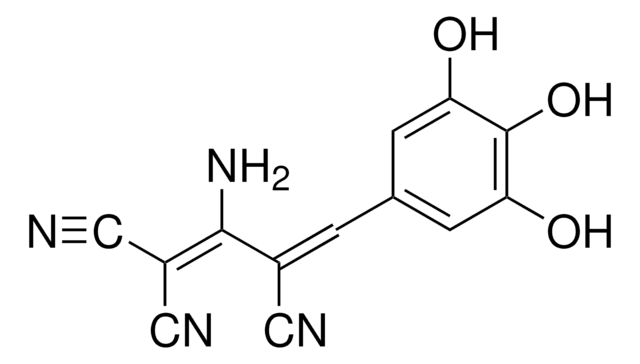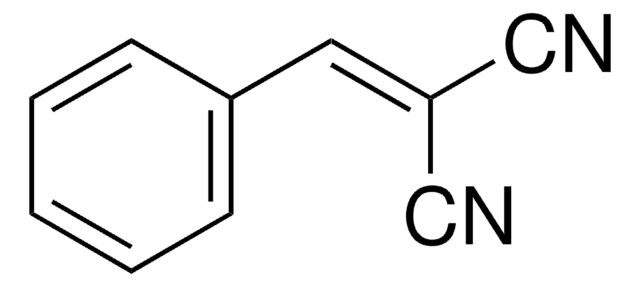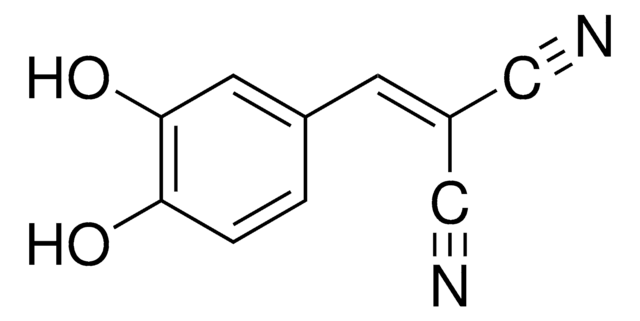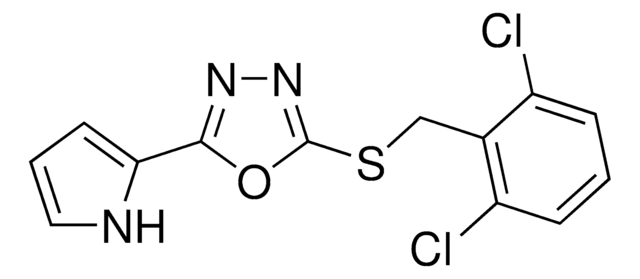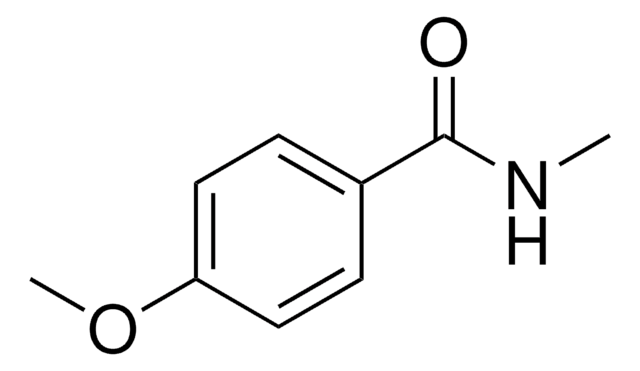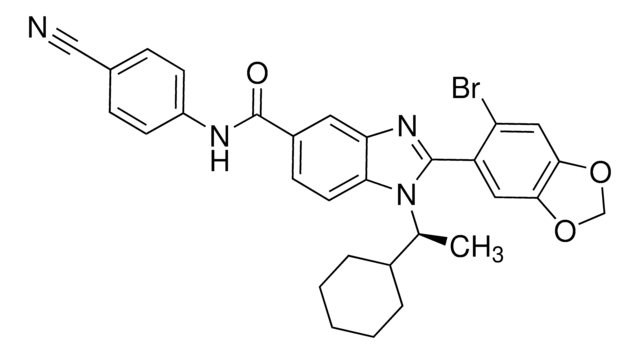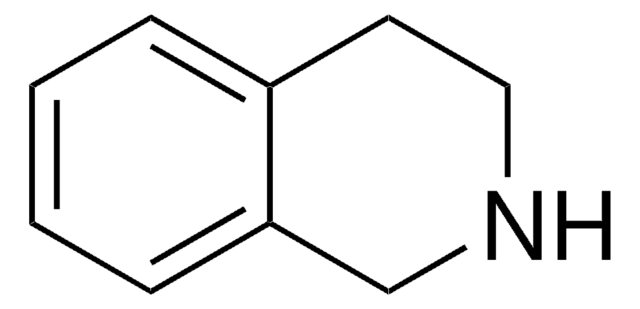T7040
Tyrphostin 1
≥98%
Synonym(s):
(4-Methoxybenzylidene)malononitrile
Sign Into View Organizational & Contract Pricing
All Photos(2)
About This Item
Linear Formula:
CH3OC6H4CH=C(CN)2
CAS Number:
Molecular Weight:
184.19
MDL number:
UNSPSC Code:
12352200
PubChem Substance ID:
NACRES:
NA.77
Recommended Products
Quality Level
Assay
≥98%
form
solid
potency
>1250 μM IC50 (negative control)
mp
113-116 °C (lit.)
solubility
chloroform: soluble 50 mg/mL, clear, light yellow
DMSO: soluble
storage temp.
2-8°C
SMILES string
COc1ccc(cc1)\C=C(/C#N)C#N
InChI
1S/C11H8N2O/c1-14-11-4-2-9(3-5-11)6-10(7-12)8-13/h2-6H,1H3
InChI key
UOHFCPXBKJPCAD-UHFFFAOYSA-N
Gene Information
human ... EGFR(1956)
Looking for similar products? Visit Product Comparison Guide
Application
Tyrphostin 1 has been used to study its effect on the increase of transgene expression in HeLa and NIH3T3 cells.
Biochem/physiol Actions
Tyrphostin 1 is a small molecule inhibitor of epidermal growth factor (EGF) receptor kinase function. This molecule associates with the substrate subsite of the protein tyrosine kinase (PTK) domain. Tyrphostin 1 is also known to block EGF-dependent receptor autophosphorylation,. Furthermore, studies have reported that tyrphostin 1 can block Ca2+ channels and inhibit growth in vascular smooth muscle cells,.
EGFR tyrosine kinase inhibitor.
Features and Benefits
This compound is a featured product for Kinase Phosphatase Biology research. Click here to discover more featured Kinase Phosphatase Biology products. Learn more about bioactive small molecules for other areas of research at sigma.com/discover-bsm.
Preparation Note
Tyrphostin 1 dissolves in chloroform at 50 mg/ml to yield a clear, light yellow solution. It is also soluble in DMSO.
Storage Class Code
11 - Combustible Solids
WGK
WGK 3
Flash Point(F)
Not applicable
Flash Point(C)
Not applicable
Personal Protective Equipment
dust mask type N95 (US), Eyeshields, Gloves
Choose from one of the most recent versions:
Already Own This Product?
Find documentation for the products that you have recently purchased in the Document Library.
P R Standley et al.
The American journal of physiology, 276(4 Pt 1), E697-E705 (1999-04-13)
Vascular smooth muscle cells (VSMC) subjected to acute or chronic stretch display enhanced growth rates in vitro and in vivo. Clinical examples of vascular hyperplasia (e.g., systolic hypertension and postinjury restenosis) suggest that local insulin-like growth factor I (IGF-I) expression
K Qing et al.
Nature medicine, 5(1), 71-77 (1999-01-12)
Adeno-associated virus 2 (AAV)-based vectors have gained attention as a potentially useful alternative to the more commonly used retroviral and adenoviral vectors for human gene therapy. Although AAV uses the ubiquitously expressed cell surface heparan sulfate proteoglycan (HSPG) as a
Tamer Nasr et al.
European journal of medicinal chemistry, 84, 491-504 (2014-07-23)
Development of new antimicrobial agents is a good solution to overcome drug-resistance problems. In this context, new functionalized thiophene, acrylamide, arylhydrazone, pyrazole and pyridone derivatives bearing sulfisoxazole moiety were designed, synthesized and evaluated for their in vitro antibacterial and antifungal
S Wijetunge et al.
Biochemical and biophysical research communications, 189(3), 1620-1623 (1992-12-30)
Selective inhibitors of tyrosine kinases, tyrphostin 23 and genistein, produced concentration-dependent inhibition of voltage-operated calcium channel currents in vascular smooth muscle cells isolated from rabbit ear artery. The potency of these two structurally dissimilar inhibitors was similar to that reported
P Yaish et al.
Science (New York, N.Y.), 242(4880), 933-935 (1988-11-11)
A systematic series of low molecular weight protein tyrosine kinase inhibitors were synthesized; they had progressively increasing affinity over a 2500-fold range toward the substrate site of epidermal growth factor (EGF) receptor kinase domain. These compounds inhibited EGF receptor kinase
Our team of scientists has experience in all areas of research including Life Science, Material Science, Chemical Synthesis, Chromatography, Analytical and many others.
Contact Technical Service